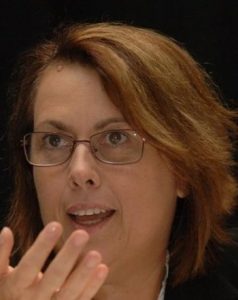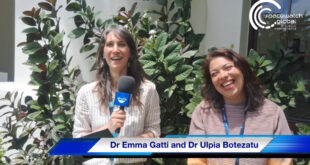
In the latest SpaceWatch Middle East interview series, Torsten Kriening speaks to Simonetta Di Pippo of UNOOSA. They discuss the work of the World Economic Forum, ‘Future of Space Technologies’ Council.
What motivates you about space?
I have always been scientifically curious about outer space and its open questions, which motivated my studies. I wanted to understand where we come from, where we are going, why the Earth survives in the Solar System’s habitable zone, and the human race with it. I found all of it beautiful, fascinating and intriguing.
I also soon realised how much space contributes to our lives here on Earth. Space research, technologies and applications influence and enable many of the things we do and take for granted, be it using a cell phone, checking the weather forecast, or getting support in disaster emergency response.
Being Director of the United Nations Office for Outer Space Affairs gives me the opportunity to promote uses of space that help us build better lives here on Earth. My goal is to make space a major driver of international cooperation and sustainable development.
International cooperation because space is international by its very nature; it doesn’t belong to one country, but to all of humanity. All norms and regulations in space must be internationally negotiated and agreed upon.
We also focus on sustainable development because space technologies can contribute to making our world better in a number of fields, be it in agriculture, water management, monitoring disease or education, to name a few.
What are your 3 top space visions for 2030? What are the 3 main concerns for space in 2030?
My vision for Space2030 is centred around UNOOSA’s purpose of bringing the benefits of space to humankind. I would like space to be a driver of equality and sustainable development. That can only be achieved with increased international cooperation and accessibility to space technologies, especially in developing countries.
Space accessibility is essential because it keeps space from being a producer of economic and social inequality. It contributes to equal distribution of opportunities, broadens economic gain, fosters research and innovation, and supports decision making processes on the basis of accessible and transparent data. Consequently, it contributes directly to sustainable development. But access can only be achieved though international cooperation and strong partnerships.
With that in mind, our Office has been mandated by the Committee on the Peaceful Uses of Outer Space (COPUOS) to organise UNISPACE+50 as a segment of its 61st session in June 2018. It will be an important opportunity for the international community to take stock of the contributions of the three global UNISPACE conferences, held in Vienna in 1968, 1982 and 1999. These global conferences examined the practical benefits of space science and technology and their applications with special focus on the needs of developing countries, global and regional development agendas, and benefits for society at large.
 Our goal for UNISPACE+50 is to build, together with all stakeholders, a new concept of global governance of space activities (“Space2030”) that supports the attainment of the Sustainable Development Goals and is based on the peaceful exploration and uses of outer space. We want to make sure space is accessible to all and that space technology and applications are used to bring concrete benefits to humankind. At the same time space needs to stay sustainable so it can be used by future generations. That is why the UNISPACE+50 will take into account the interdependencies in the space sector and foster international cooperation, paying special attention to future space-faring and developing countries while carefully considering the long-term sustainability of outer space activities.
Our goal for UNISPACE+50 is to build, together with all stakeholders, a new concept of global governance of space activities (“Space2030”) that supports the attainment of the Sustainable Development Goals and is based on the peaceful exploration and uses of outer space. We want to make sure space is accessible to all and that space technology and applications are used to bring concrete benefits to humankind. At the same time space needs to stay sustainable so it can be used by future generations. That is why the UNISPACE+50 will take into account the interdependencies in the space sector and foster international cooperation, paying special attention to future space-faring and developing countries while carefully considering the long-term sustainability of outer space activities.
But that is not all our Office does regarding those issues. Our Human Space Technology Initiative (HSTI) focuses on capacity-building as a way to increase access to space for developing countries. We involve more countries in activities related to human space flight and attempt to make space exploration a truly international effort, inclusive and open to everyone. Under that initiative we have announced an agreement with Sierra Nevada Corporation, the United Nations Dream Chaser ® Mission, which will offer Member States affordable unmanned missions to low-Earth orbit (LEO). KiboCUBE, a partnership with the Japan Aerospace Exploration Agency, offers educational and research institutions from developing countries the opportunity to deploy cube satellites from the International Space Station (ISS). A fellowship programme facilitated by UNOOSA offers research teams the possibility of conducting microgravity experiments at the Bremen Drop Tower in Germany. And also under HSTI, an agreement signed this year between UNOOSA and the China Manned Space Agency will enable Member States to conduct space experiments on-board China’s future space station.
UNOOSA is also working to contribute to key United Nations programmes that have a 2030 timeframe, such as the 2030 Agenda for Sustainable Development, with its 17 Sustainable Development Goals, and the Sendai Framework for Disaster Risk Reduction 2015-2030.
I hope in the coming years we will see greater cooperation in the space sector, including with the private sector, so that we might work together towards building better lives on Earth. I believe space can be even more useful in providing improved well-being for all people and playing a valuable role in the attainment of the global development agendas.
How do you see the 4th Industrial Revolution having an impact on space?
We are witnessing a fundamental change in how technologies are being used. They are now fusing the physical, digital and biological worlds. That has an impact on all disciplines, economies and industries, sometimes even challenging our ideas about what it means to be human. This revolution will certainly also have a great impact on our uses of space and how it affects our lives.
First of all we will see an increased use of space technologies and its applications. The increased circulation of digitalised information depends on our uses of satellite technology. The number of satellite launches should increase dramatically in the years to come. Other new initiatives will give us easier access to microgravity conditions. And we will see even greater participation from the private sector in space. The number of companies and the variety of services they offer will definitely be a lot higher than what we see now, and the increase will be very rapid.
This is an important moment, where world leaders and citizens should work together to put people first, remembering that technology should be used for the benefit of humankind. Our future is at stake and it is only through mutual understanding and cooperation that we will be able to achieve results in solving issues such as climate change, amongst many others. Space activities will stand as an important tool to help humanity to face these challenges.
So we need more agile regulations to act with new technologies and legal challenges – such as space weapons, cyber, space resources (code of conduct)?
What we need is increased international cooperation, and to improve our efforts to build transparency and confidence-building measures. There are legal issues such as definition and delimitation of outer space, the use of nuclear power sources in outer space, or legal mechanisms on space debris mitigation measures, which have been pending for many years. On top of that there are more recent questions such as the weaponisation of space, cybersecurity and asteroid-mining. These are all problems that can only be solved if we all work closer together.
How can informed press help to conduct your messages? What kind of press support is needed for a peaceful use of outer space?
An informed press can be of great assistance to sharing our message on the value of space for making our world a better place for all. It can help us raise public awareness on how relevant space is in our lives and highlight the fact that it is a limited resource.
Space is incredibly relevant, but when you are using your phone or checking if it will rain tomorrow, it is easy to forget that there is a whole infrastructure that allows you to do that. A number of people are working so that things we consider basic and part of everyday life work properly. It is important that people realise that most of the technology that sustains our way of life depends on space. That means regulating the use of space and space technology, keeping space free of weapons, and ensuring sustainable and equitable access to space are very relevant to all of us. Space debris, just as one of many possible examples, could become a major issue in the future as it could make sending satellites into space almost impossible. That would mean we would have limited communications or modern navigation tools, for example, which could have a global impact.
Issues such as these will only become widely discussed and solutions to problems considered if they are seen as relevant by the press. Their support in educating people about space is invaluable.
Simonetta Di Pippo is the Director of the United Nations Office for Outer Space Affairs (UNOOSA), which is mandated to enhance international cooperation in space activities to promote their use for humanity. Prior to joining UNOOSA in 2014, she was Head of the European Space Policy Observatory at Agenzia Spaziale Italiana (ASI) in Brussels Ms. Di Pippo also served as Director of Human Spaceflight of the European Space Agency from 2008 to 2011, and Director of the Observation of the Universe at ASI from 2002 to 2008, where she started her career in 1986. She has been an Academician of the International Academy of Astronautics (IAA) since 2013, and since 2016 a member of the IAA Board of Trustees. Ms Di Pippo holds a Master’s Degree in Astrophysics and Space Physics from University “La Sapienza” in Rome and an Honoris Causa Degree in Environmental Studies from the St. John University in Vinovo. Ms. Di Pippo was knighted by the President of the Ita lian Republic in 2006. In 2008, the International Astronomical Union named asteroid 21887 “Dipippo” in honour of her contribution to space exploration
SpaceWatch Middle East thanks Simonetta Di Pippo of UNOOSA, for the interview.
Original published at: http://spacewatchme.com/2017/01/simonetta-di-pippo/
 SpaceWatch.Global An independent perspective on space
SpaceWatch.Global An independent perspective on space

